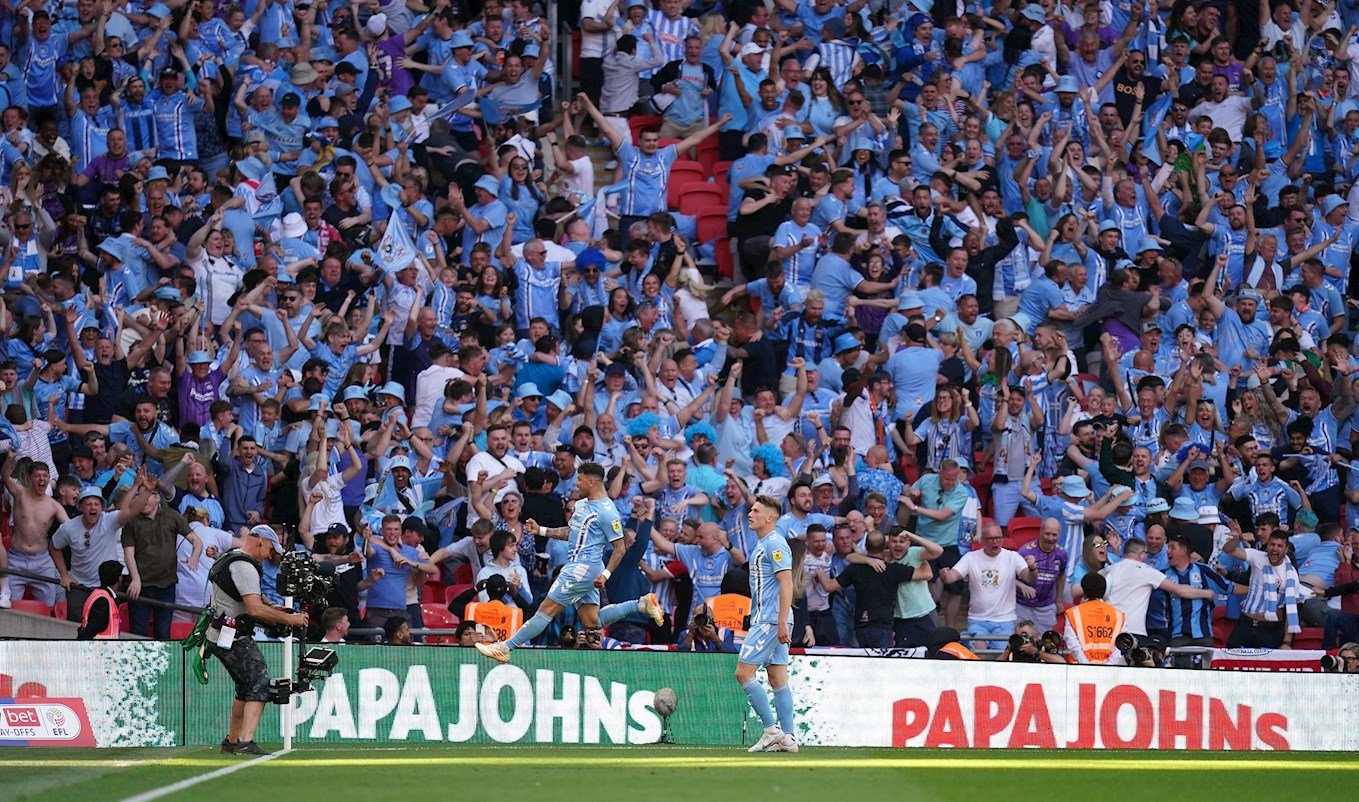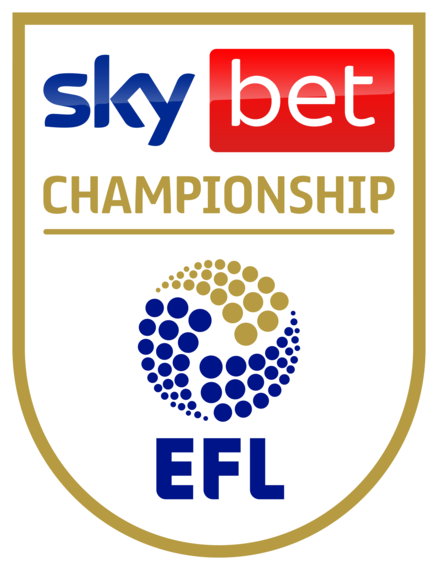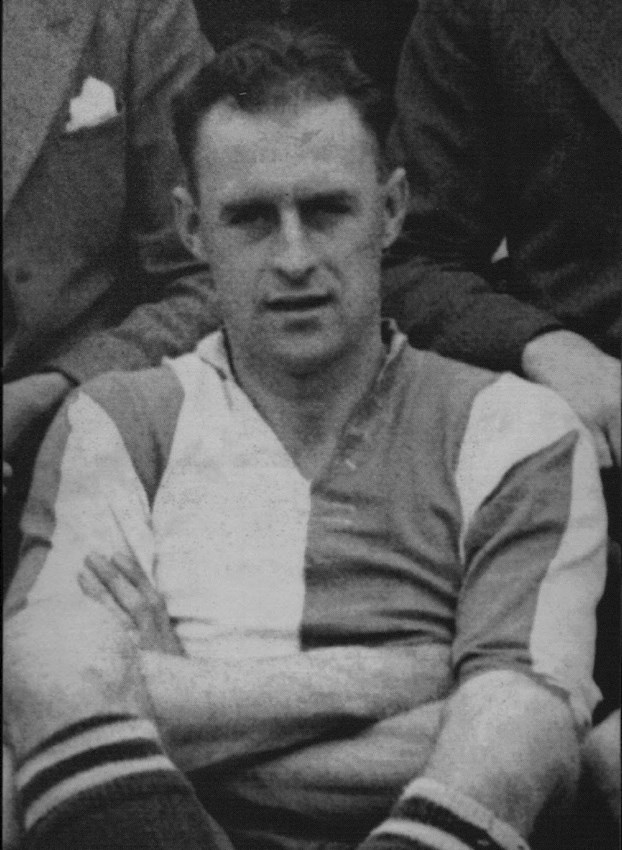
Coventry City - A Brief History
In The Beginning
The club was founded in 1883 by Willie Stanley, an employee of local cycle firm Singers.
The club as a result was known as Singers FC until 1898 when the name was changed to Coventry City.
Early matches were played at Dowells Field, off Binley Road until a move to Stoke Road in 1887 before the move to the Highfield Road site in 1899. The period of 1887 to 1892 was a golden one for the club with the Birmingham Junior Cup being won in consecutive years, 1891 and 1892.
Up And Down
Having been members of the Birmingham League since 1894 the club progressed to the Southern League in 1908 before being elected to Football League Division Two immediately after World War I.
In 1910 they enjoyed one of their finest moments when as a non-league club they reached the FA Cup quarter finals, beating First Division Preston and Nottingham Forest en route.
In 1919, Coventry City were voted into the Football League. City's first season in the League in 1919/1920 was a disaster. They lost their opening game, at home to Tottenham, 0-5 and did not win a match until Christmas Day.
Setting the precedent for their later dramatic survival battles, they avoided relegation on the final day, but only after a bribery scandal rocked the club. Throughout the Twenties City struggled, with managers coming and going, until relegation finally caught up with them in 1925.
The Booming Thirties
It was not until the arrival of manager Harry Storer in 1931 that fortunes improved and the 1930's were a golden period for the Bantams, as the club was nicknamed.
Despite City being substantially in the red, Storer developed a side which scored 100 goals in four seasons out of five, with the club's greatest ever goalscorer Clarrie Bourton netting 49 goals in 1932 and 40 the following season.
In 1936, they won the Third Division South championship after a nail-biting final day 2–1 victory over Torquay United and returned to Division Two after eleven years in the lower division - with crowds averaging over 20,000. The three seasons prior to World War II saw the club come close to promotion to Division One. In 1938 they missed it by one point, and many observers believed that but for the war City would have achieved that target.
Back To Business
The post-war years brought troubled times, Storer left for Birmingham City in 1945 and returned in 1951 but his ageing side were relegated to Division Three South in 1952.
That decade witnessed many false dawns before the team embarked on the slide, which touched rock bottom in 1958 with membership of the newly formed Division Four. Fortunately, one season was enough to clamber out of the league's basement.
The Sky Blue Era
The 1960's was a boom time in Coventry, with car factories keeping pace with the consumer revolution in the nation at large.
It was the arrival of Jimmy Hill as manager in 1961 that sparked the revolution at the club. A new sky blue kit was unveiled, the nickname was changed to the Sky Blues, trains were laid on for fans to travel to away games and pre-match entertainment became commonplace, plus many more innovations.
Most importantly, on the pitch the team delivered. In 1963, after a feverish FA Cup run, City lost out in the quarter-finals to Manchester United, but the following season were champions of Division 3, boasting average crowds of 26,000.
The Highfield Road stadium was substantially rebuilt in the 1960's with three new stands erected in four years. Hill, with the backing of Chairman Derrick Robins, was the Pied Piper and after three exciting seasons in Division 2 he steered the club to the title and promotion to the promised land of Division 1 in 1967.
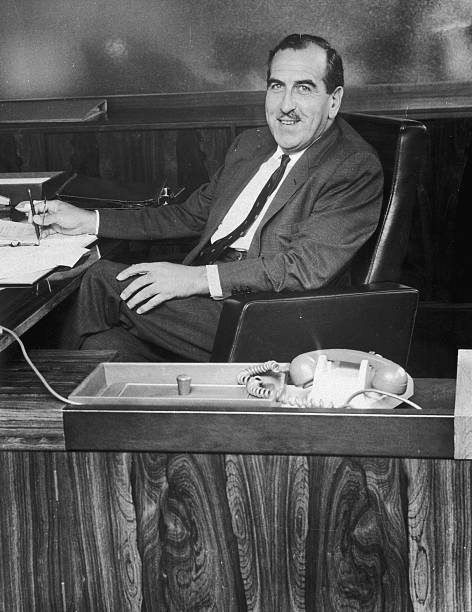
In that promotion season, 1966-67, the team went 25 games unbeaten, and the campaign reached an exhilarating finale in what was dubbed the 'Midlands Match of the Century', when nearest rivals Wolves were beaten 3-1 in front of a record 51,455 Highfield Road crowd to clinch the Division 2 championship.
On the eve of their baptism in the top flight Jimmy Hill announced that he was leaving the club to pursue a career in television, a blow which many people - inside and outside Coventry - thought would sound the death knell for the club's ambitions.
The first season in the top flight was long and hard and serious injuries to key players George Curtis and Ian Gibson made new manager Noel Cantwell's task all the harder.
He spent over £300,000 on new players and, in what was a precursor for the future, the relegation battle went to the final game of the season at Southampton, where a goalless draw kept City up. Despite the paucity of good results, however, City's crowds averaged over 34,500, a record never topped.
The following season was almost a carbon copy apart from the ending when City finished their games leaving FA Cup finalists Leicester City still to play five matches and needing seven points to send the Sky Blues down. Rumours of favours for old friends circulated as Cantwell's former team, Manchester United, beat Leicester in their final game to save Coventry.
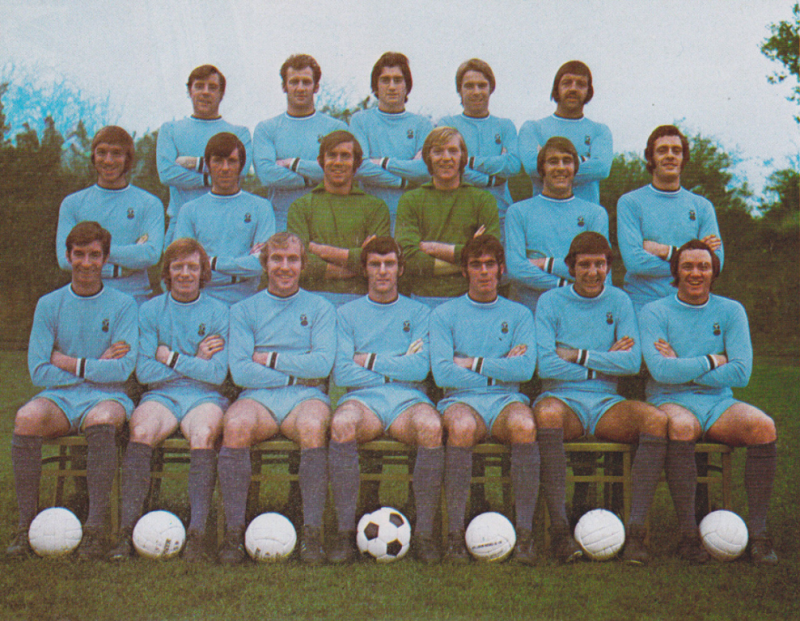
No one would have predicted that twelve months later virtually the same team would finish sixth and qualify for Europe.
The place in Europe being clinched on a passionate night at Molineux when a Brian Joicey goal beat the old enemy Wolves. Alas the European experience was disappointing.
After easily overcoming the Bulgarians, Trakia Plovdiv, City without their injured keeper Glazier, slumped to a 6-1 defeat to Bayern Munich.
Cantwell was sacked in 1972 and followed by the Joe Mercer/Gordon Milne regime and their signings of Stein and Hutchison brought two of the most exciting players of the era to the club.
A good league run, three FA Cup wins and a high level of entertainment, raised hopes but Wolves shattered the Wembley dream in the quarter-finals. Jimmy Hill returned as Managing Director in 1975, and later became Chairman but failed to spark his magic a second time.
Finances were poor and the club's best players were sold to balance the books, although the team of 1977/78 scored 75 goals and played arguably the best football of the First Division era.
Milne was replaced by Dave Sexton in 1981 and the ground was made all seater, a disastrous mistake, which combined with lacklustre performances on the pitch, saw average crowds down to 10,000.
In 1983 Hill resigned as Chairman and Sexton was replaced by Bobby Gould but on the field the team struggled, with relegation avoided on the last day of the season three years running.
In 1986 however Gould's successor Don Mackay was replaced by John Sillett, alongside MD George Curtis, who supported by Coventry-born chairman John Poynton took the club to their finest hour twelve months later.
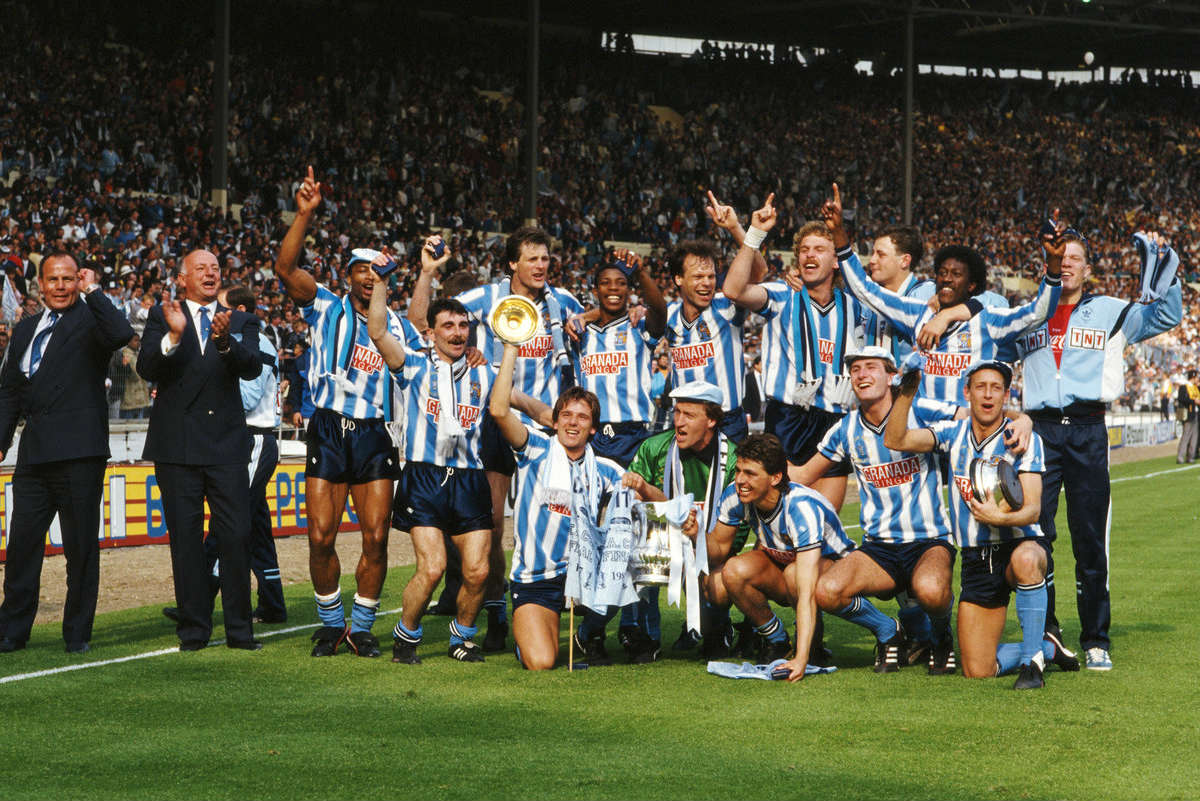
A team without star names won their way to Wembley with outstanding teamwork, a gritty determination and above all a sense of fun. They defeated Tottenham Hotspur 3-2 after extra time in one of the finest post war FA Cup Finals, with goals from David Bennett, Keith Houchen's diving header and a Gary Mabbutt own goal.
After taking sole command after the Cup victory, Sillett kept the club in mid table respectability for three seasons but the fans wanted more and after two Cup banana skins at Sutton and Northampton he was sacrificed in 1990 and replaced by the former England captain Terry Butcher.
The inexperienced Butcher lasted 14 months and his temporary successor Don Howe style of play was unpopular, before Bobby Gould returned in the summer of 1992.
The Premiership Years
Gould's first season was relatively successful with the team rarely out of the top eight but tailing off to finish 15th. Two months into the following season, after a 1-5 mauling at QPR, Gould threw the towel in, citing the imminent sale of Peter Ndlovu as the reason.
Gould's assistant Phil Neal was promoted but lasted only sixteen months as manager and was replaced in February 1995 by the former Manchester United, West Brom and Aston Villa manager Ron Atkinson.
Ron generated lots of interest and increased gates by 5,000 but despite having substantial funds at his disposal City always struggled under him and in November 1996, with another relegation battle looming he was moved upstairs with his assistant Gordon Strachan taking over.

Relegation was avoided on the final day of the 1996-97 season with a nerve-wracking win at Tottenham when anything less would have seen them go down.
Amazingly, the 1997-98 campaign saw City safe from relegation fears well before the end of the season. A marvellous unbeaten run of thirteen games which was inspired by the dazzling form of Dion Dublin and Darren Huckerby took City to the FA Cup quarter-finals for the first time since 1987 and only a penalty shoot-out at Bramall Lane stopped progress.
Strachan was hailed as one of the top young managers in the game and Dublin was chosen for England.
The post Wembley years were dogged by poor signings, sales of their best players, a merry-go-round of managers and empty promises.
Between 1993 and 2001 much occurred both on and off the pitch. Major ground improvements were made and attendances increased by 50%.
In 1999 City pulled off a major coup by signing Robbie Keane, pictured, for £6 million - a club record fee. He only stayed at Coventry for one season but with Gary McAllister and Moustapha Hadji in top form City fans saw some of their best football for years.
In the same year, Coventry City first revealed plans to move to a 40,000 seat multi-purpose Arena in Foleshill, with retractable roof and pitch.
In 2000, Keane's departure to Inter Milan for £13 million and McAllister's move to Liverpool left City in disarray and in May 2001 the club were relegated after 34 years in the top flight.
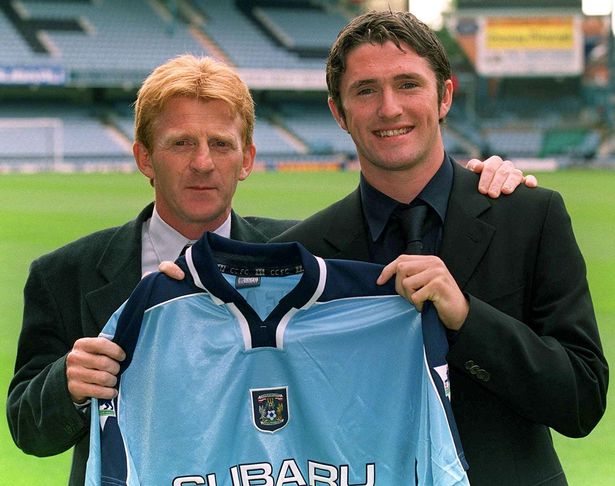
Return to the Football League and the end of Highfield Road
Despite shelling out £5 million for Lee Hughes, Gordon Strachan paid the price for relegation just weeks into the new season and was replaced by Roland Nilsson.
Roland's reign started well but the season petered out with five defeats in a row after a place in the play-offs had looked achievable. Roland left at the end of the season and was replaced by former player Gary McAllister.
Meanwhile boardroom changes took place in January with Bryan Richardson being ousted and Mike McGinnity taking over as chairman. Financially the club was in dire straits. Huge cost cutting was required to prevent the club from going into administration and this was achieved mainly through the sale of the highest earning players, while the collapse of ITV Digital hit clubs in the First Division hard. Hughes and David Thompson left for cut price fees.
In October 2003 the City Council gave the greenlight for the Arena project to be the club's new 32,000 seater home, with the Arena to be half Council, half Higgs Charity-owned.
On the pitch there was little but consolidation and therefore frustration for the fans who had been spoiled with 32 years in the top flight. McAllister's first season in charge ended in 19th place and halfway through the 2003/2004 campaign he left due to personal reasons.
His number two, Eric Black, was offered the caretaker role and in January 2004 took over full-time, supported by Archie Knox. For a brief while Black offered hope of a brighter future as results took a turn for the better and the free-scoring days of the past returned. City fell short of a play-off finish but after a 5-2 win at Gillingham on the penultimate day of the season Black was surprisingly sacked with Peter Reid taking over.
The 2004/2005 season started poorly and by the New Year, City were looking at a relegation battle. Peter Reid departed, with former player Micky Adams taking over. His main task was to steer the team clear of relegation - a job he completed in some style when City thrashed Derby 6-2 in the final ever game at Highfield Road after 106 years on 30th April 2005.

Ricoh Arena move and another relegation
On August 20, 2005, the Sky Blues played their first ever game at their new stadium, the Ricoh Arena, when they beat QPR 3-0 in front of a safety capped capacity of 23,000. In November 2005, Mike McGinnity stepped down as Chairman due to ill health. Despite a slow start to 05/06, the Sky Blues finished the campaign strongly and ended up breaking a number of long-standing records on their way to an eighth placed finish.
However, that progress struggled to continue in 2006/07 and an unprecedented run of results between December 2006 and January 2007 saw Adams leave the club. In February 2007 the club appointed Iain Dowie as its new manager. Dowie had an instant impact, ensuring consolidation in the Coca-Cola Championship for another season.
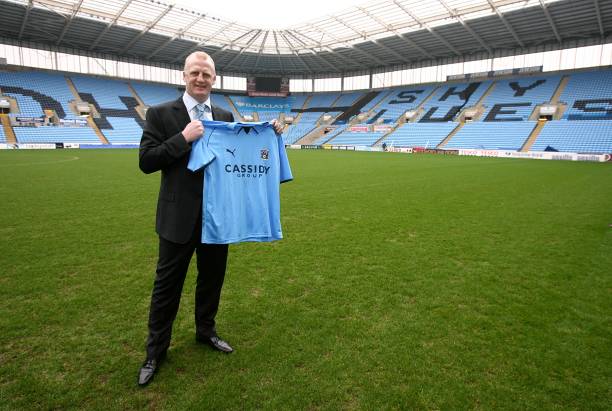
The 2007/08 season saw a memorable Carling Cup win over Manchester United, the departure of MD Paul Fletcher and then newly appointed chairman in former director Joe Elliott looking for new investors - with the threat of administration looming. In December 2007, with less than an hour before the deadline, a deal was struck with SISU, with former footballer Ray Ranson becoming Chairman.
In February 2008, the club relieved manager Dowie of his duties - and on the same day the appointment of Chris Coleman was announced. The Sky Blues escaped the threat of relegation, but a 4-1 final day defeat away to Charlton Athletic saw nerves aplenty.

Coleman's first full season in charge saw an impressive FA Cup run, only stopped by Quarter Final defeat at a sold-out Ricoh Arena against Chelsea, but a disappointing end to the campaign saw the Sky Blues finish 17th in the Championship. The 2009/10 saw the Sky Blues in the Play-Off spots during March, but an 11-game run without a win saw Coleman dismissed at the end of the season.
Aidy Boothroyd took charge in June 2010 and his early efforts saw the club scaling the heady heights of the play-off spots, although a post-Christmas slump ultimately called time on his nine-month stay at the Ricoh. Andy Thorn, club chief scout of three years, took up the role of caretaker manager for the remainder of the 2010/11 season but two weeks later Ranson himself resigned as chairman.
Thorn's impressive run of results as caretaker boss, a run which saw the club secure their Champiionship status with three games to spare, came during the arrival of new chairman Ken Dulieu who made it one of his first jobs to formally offer Thorn the permanent manager's position two days before City's final home game of the 2010/11 season against play-off contenders Reading.
Thorn's first full season in charge was a tough one though as the Sky Blues were relegated in to League One, English football's third tier, for the first time in 48 years.
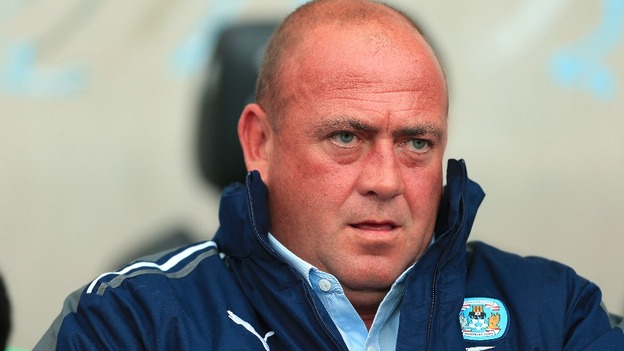
Third tier football
Thorn's spell as manager lasted four games into the 2012/13 season after three consecutive draws in League One with Thorn departing after a 2-2 home draw with Bury, before Mark Robins was appointed as manager in late September 2012.
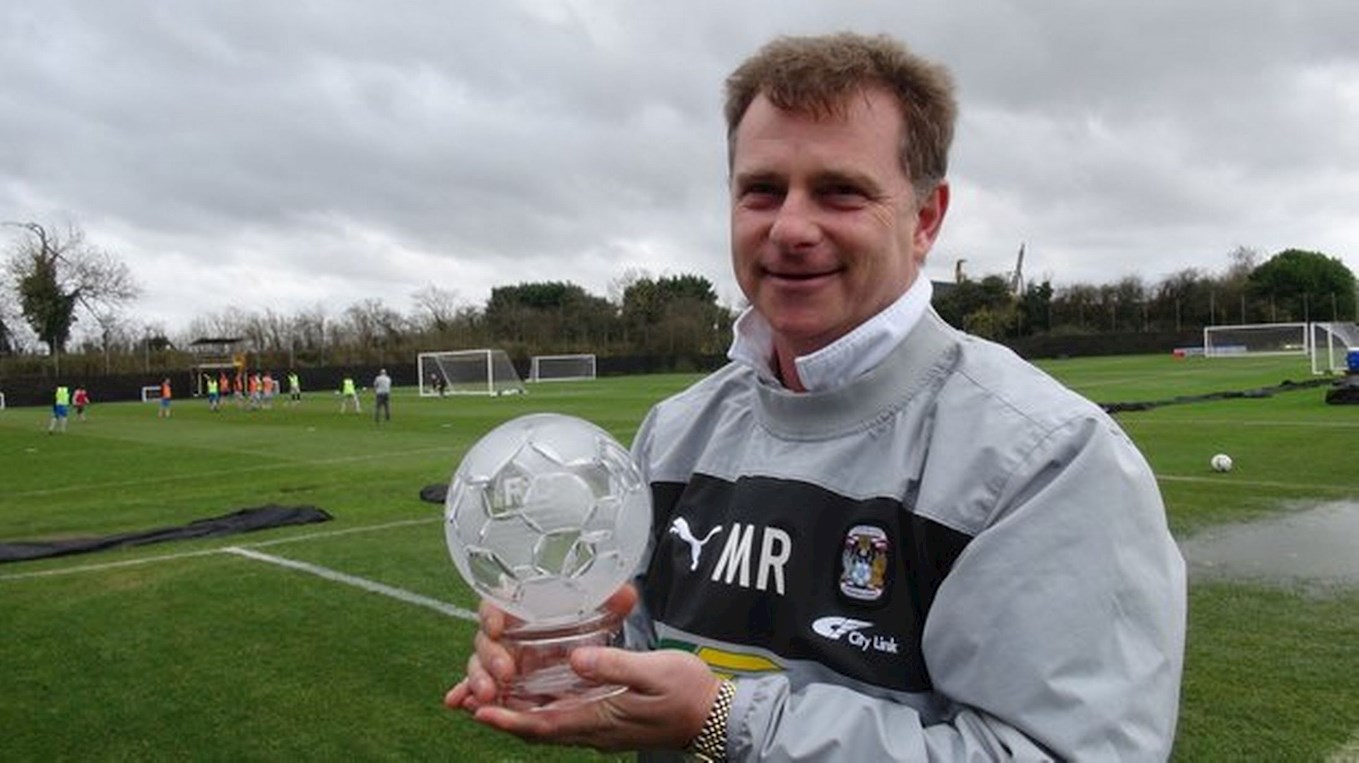
Robins' appointment undoubtedly revived the Sky Blues' league campaign as they embarked on a run of form that brought them to within touching distance of the play-offs. City also reached the Area Final of the Johnstone's Paint Trophy, heralding another sell-out but defeat over two legs to Crewe. The turnaround of results under Robins' reign also attracted attention from Championship side Huddersfield Town who moved to convince Robins to make the move north in February 2013, leaving the Sky Blues to look for a new manager to see out the remainder of the campaign.
Former City defender Steven Pressley was named as Robins' successor in March. Pressley's first few days in the job were not smooth ones as the club were handed down a ten-point deduction by the Football League after an arm of the club was put into administration following a rental dispute with the Ricoh Arena management company, a deduction that all but put the play-offs out of reach.
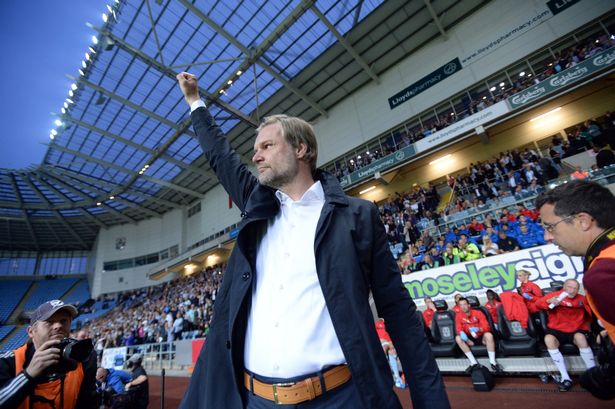
The off-the-field situation continued to develop as the club was forced to look for a temporary home to play their home games from 2013/14 following protracted, unsuccessful talks with the Ricoh Arena's management company. A deal was announced to groundshare with Northampton Town.
The 2013/14 campaign saw City start with a further point deduction and playing in front of considerably smaller crowds at Sixfields Stadium. However, the Sky Blues produced scintillating football at times, spearheaded by the goalscoring of Callum Wilson and Leon Clarke, and Pressley's side finished 18th.
Having begun the season at Sixfields, on 21st August 2014 a deal was agreed which saw the Sky Blues return to the Ricoh Arena. The memorable first game back saw a 1-0 win over Gillingham, in front of over 27,000. In February and with the Sky Blues just outside the relegation places, Pressley was dismissed and replaced by Tony Mowbray. Mowbray would guide City to survival, with a last day win at Crawley Town proving decisive.
In 2015/16, Mowbray's side were in the upper reaches of League One - hitting the top of the table in November. However that form fell away, and the Sky Blues would finish the campaign in 8th - outside of the Play-Offs.
City's poor start to the 2016/17 season saw Mowbray leave in September 2016. Technical Director Mark Venus took temporary charge and there was a slight upturn in fortunes, but poor winter form saw Russell Slade appointed as permanent manager in December 2016. He would not stay in post for long in a tumultuous season - being sacked in March after only one league win. He had however guided City to the Checkatrade Trophy Final, a welcome distraction in a season that would eventually result in relegation to League Two.
Robins Revival
Mark Robins returned to the Club in March 2017. After immediate improvements in the side, Robins lead City to a 2-1 win over Oxford United in the Checkatrade Trophy Final at Wembley Stadium, in front of over 45,000 Sky Blues fans, securing the Club's first silverware since 1987.
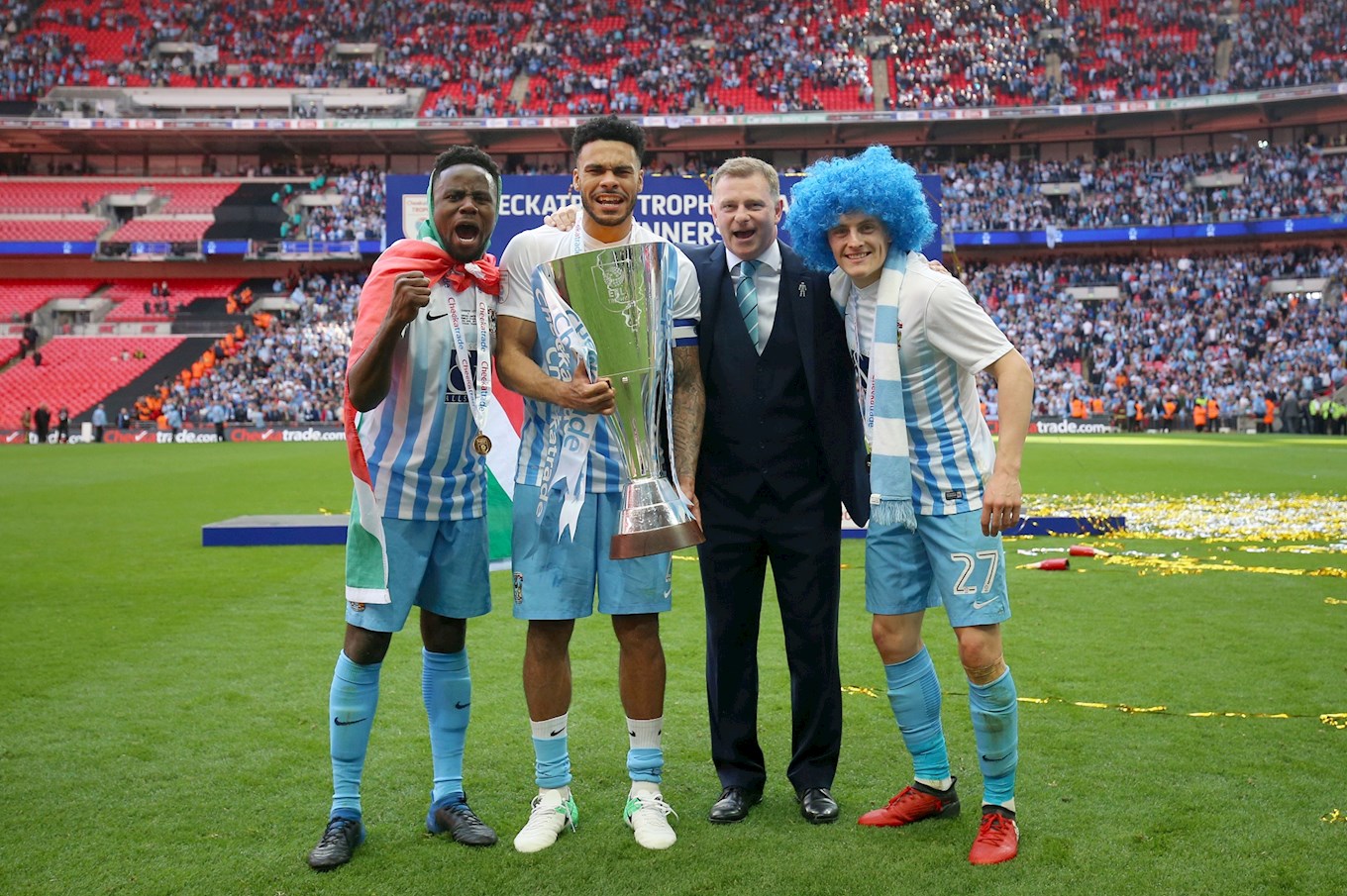
After relegation was confirmed, Robins set about rebuilding the side in League Two. Ambitions of promotion were set and after exciting football throughout the campaign, the Sky Blues finished the campaign in 6th place - the Club's highest position in a league since 1970, and enough to secure a Play-Off place. After a thrilling two leg semi-final win over Notts County, the Sky Blues beat Exeter City 3-1 in the Play-Off Final at Wembley Stadium (with another 40,000 City fans in attendance) to secure a first promotion in 51 years.
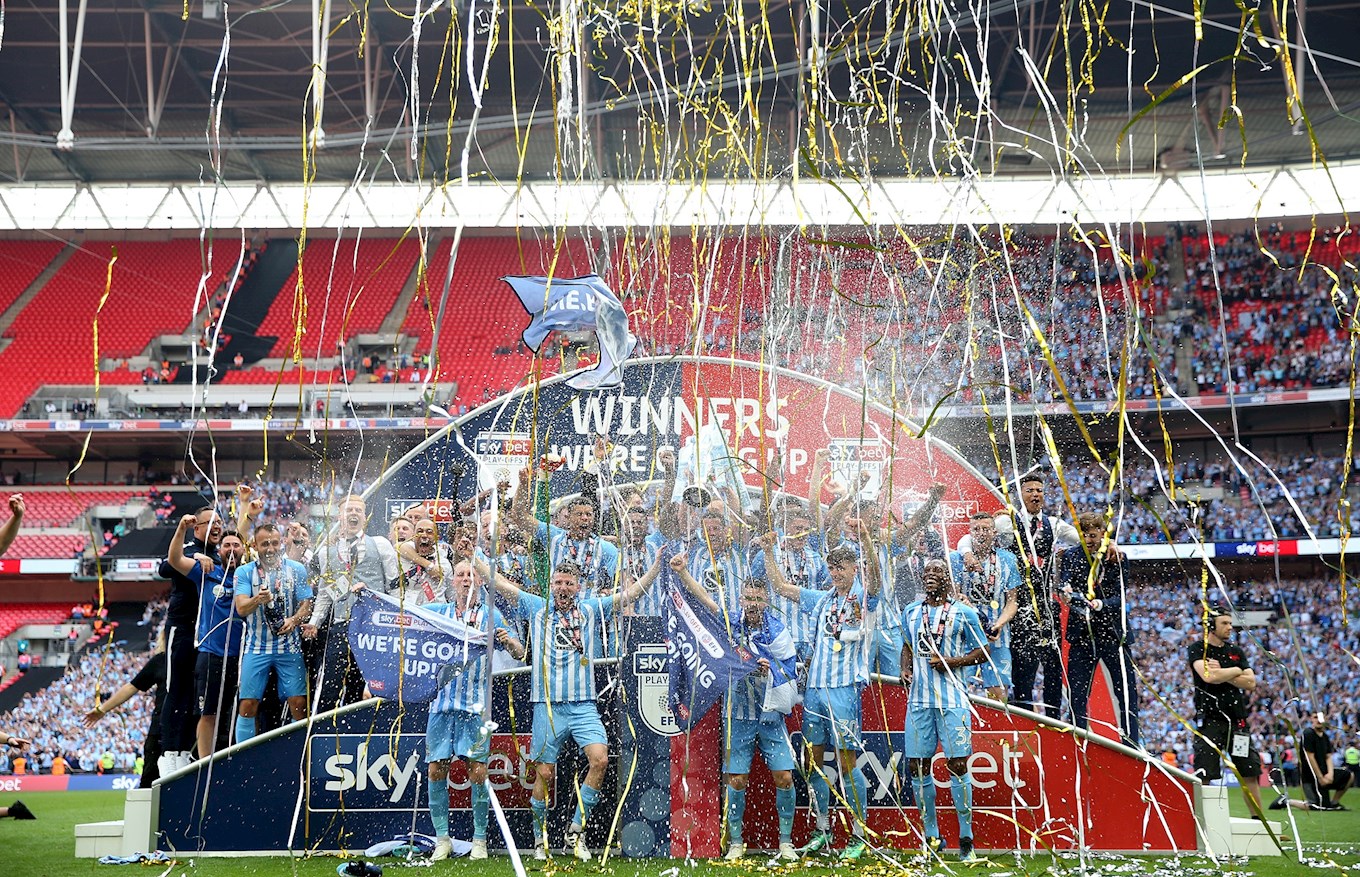
The 2018/19 season saw the Club consolidate in League One, finishing just outside the Play-Off positions in 8th place. After Wasps Rugby Club, owner of the Ricoh Arena since their move north in 2014, and the Sky Blues didn't reach agreement for City to play at the stadium, Coventry City were forced into another groundshare - this time at Birmingham City's St Andrew's Trillion Trophy Stadium.
The 2019/20 campaign would be historic. The Sky Blues played some of the most attractive football seen by the side in many years, and were rarely outside of the Play-Off places and often in the upper echelons of the league table. After an earlier spell at the summit, City reached the top again on 1st March. After the Coronavirus pandemic swept the world and reached the UK, football was initially suspended on 13th March. As the suspension continued, the likelihood of the season being completed on the pitch diminished. On 9th June 2020 Coventry City were confirmed as League One Champions, after the season was concluded based on 'Points Per Game' and the Sky Blues were clear winners in unprecedented times.
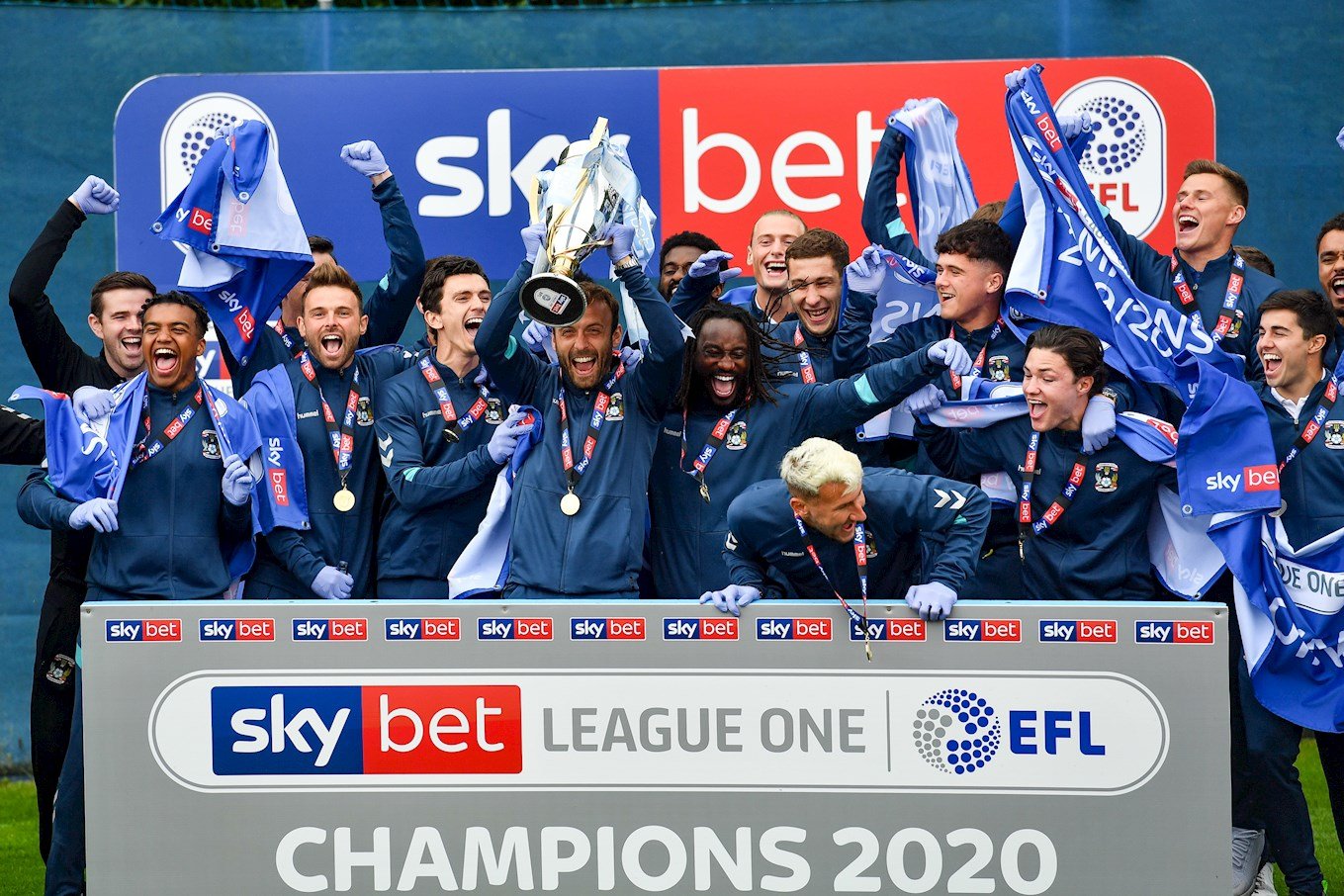
Coventry City kicked off the 2020/21 season back in the SkyBet Championship, continuing to groundshare at St Andrew's. On 10th March 2021, an 10-year agreement was signed with Wasps Group that would see the Sky Blues return to play at the Ricoh Arena from August 2021. The Sky Blues finished the season in 16th place, 12 points clear off the relegation zone, ensuring that the 2021/22 season's return to Coventry would see Championship football again.
The Sky Blues would return to Coventry in August 2021, beginning with a dramatic win over Nottingham Forest. They would finish the season in 12th place, with highlights including comprehensive home and away victories over eventual champions Fulham.
The 2022/23 campaign would be one of the most memorable seasons of recent years, with a number of highs and off-field talking points. The start of the home campaign was delayed due to pitch at the Arena not being safe, following use at the Commonwealth Games and failure by Wasps to deliver a promised new pitch. By October, both the Arena and Wasps had entered administration - with the Arena being purchased in November by Frasers Group, but not before doubts over City's ability to continue to play at the Arena in the interim period.
Also in November, Doug King became new majority owner of Coventry City and an agreement made to play at the Arena until the end of the campaign. King would complete his 100% purchase of the Club in January 2023, while in April a five-year agreement was signed for the Sky Blues to continue to play at the Arena. Tremendous form shown by Mark Robins' side from the end of January saw the Sky Blues earn a place in the Sky Bet Championship Play-Offs with a fifth place league finish - the Club's highest league finish since 2001. Over two legs, Middlesbrough were dispatched 1-0 on aggregate. In a dramatic final at Wembley, Luton Town went ahead only to be pegged back by midfielder Gustavo Hamer's equaliser. Extra-time and penalties followed, with the Sky Blues agonisingly losing 6-5 in the shoot-out to miss out on a Premier League place by the tiniest of margins.
